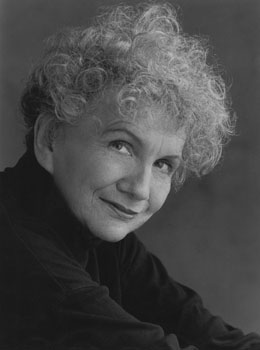

| Visitors Now: | |
| Total Visits: | |
| Total Stories: |
Alice Munro – Nobel Prize Winner is No Tolstoy

(left, Alice Munro.)
If Henry Kissinger and Barack Obama can win the Nobel Peace Prize,
we shouldn’t be surprised that a depressive who depicts middle class Canadian life
as tawdry and banal should last week receive the 2013 Nobel Prize for Literature.
Thus, the Nobel Prize Committee promotes a demeaning materialistic image of life,
as opposed to one that sees man as having a Divine Creator and a spirit that seeks
the Eternal.
Christian Lorentzen has surveyed Munro’s oeuvre and describes what
now passes for great literature.
“Reading
ten of her collections in a row has induced in me not a glow of
admiration but a state of mental torpor that spread into the rest of
my life. I became sad, like her characters, and like them I got
sadder. I grew attuned to the ways life is shabby or grubby…”
“Poor Rose”
by Christian Lorentzen
(London Review of Books, June 2013)
(Edited/abridged by henrymakow.com)
There’s
something confusing about the consensus around Alice Munro. Her critics begin by asserting her goodness, her
greatness, her majorness or her bestness, and then quickly adopt a
defensive tone, instructing us in ways of seeing as virtues the many
things that might be considered shortcomings…She writes about and redeems ordinary
life, ordinary people – ‘people people people’, as Jonathan
Franzen puts it.
Ordinary
people turn out to live in a rural corner of Ontario between Toronto
and Lake Huron, and to be white, Christian, prudish and dangling on a
class rung somewhere between genteel poverty and middle-class
comfort…
Reading
ten of her collections in a row has induced in me not a glow of
admiration but a state of mental torpor that spread into the rest of
my life. I became sad, like her characters, and like them I got
sadder.
I grew attuned to the ways life is shabby or grubby, words
that come up all the time in her stories, as well as to people’s
residential and familial histories, details she never leaves out. How
many rooms are in the house, and what sort of furniture and who used
to own it and what is everybody wearing? To ask these questions is to
live your life like a work of realism.
I saw everyone heading towards
cancer, or a case of dementia that would rob them of the memories of
the little adulteries they’d probably committed and must have spent
their whole lives thinking about.
—-
 The
The
Beggar Maid: Stories of Flo & Rose (1978) follows a woman, Rose,
whose life trajectory bears similarities to Munro’s: a hardscrabble
childhood in Ontario; devotion to schoolwork and high social anxiety
at school; a scholarship to a provincial university; a romance there
that leads to an early marriage, decampment to the suburbs of
Vancouver, and immediate motherhood; a middle-class existence that
renders the husband stiff, even a bit right-wing; a yearning for a
more bohemian milieu; adultery of an unsatisfying sort with an artsy
fellow; rupture, divorce, squabbles over child custody; temporary
self-imposed exile to some snowbound outpost in the middle of Canada
where the singles scene isn’t exactly hopping and desperate
loneliness ensues; a return to Ontario, more bad love affairs, and
the caretaking of an aging parent; a lucky break that leads to an
exceptional career and something like fame.
…Rose
becomes, in the end, an actress on stage and television, not a
distinguished author.
‘Mischief’
is the adultery story in The Beggar Maid: in the maternity ward Rose,
whose husband, a former graduate student in history, is now running
his family’s department store, befriends a woman called Jocelyn who
is connected to the university scene in Vancouver. One of their jokes
involves starting sentences with the phrase ‘I’m no prude but …’
Clifford, Jocelyn’s husband and a musician, kisses Rose at a party,
and they start an affair that involves snogging in cafés and a
logistically awkward rendezvous in a town where Clifford is playing
in a concert. He gets cold feet and the affair is never consummated.
 (In wake of Nobel Prize, unwary people stock up on Munro)
(In wake of Nobel Prize, unwary people stock up on Munro)
Years later, Rose is divorced and living in rural Ontario, and
Jocelyn and Clifford have moved to Toronto. They’re all in their
forties and their children have grown up. Jocelyn and Clifford invite
Rose over for occasional long nights of drinking; they also have it
out in front of her about their marital dissatisfactions. One night
after a party:
‘What
can we do?’ said Rose. ‘We shouldn’t drink anymore.’
‘We
could make love,’ Clifford said.
Jocelyn
and Rose said, ‘Really?’ at exactly the same time. Then they
linked their little fingers and said, ‘Smoke goes up the chimney.’
Following
which, Clifford removed their clothes. They didn’t shiver, it was
warm in front of the fire. Clifford kept switching his attention
nicely from one to the other. He got out of his own clothes as well.
Rose felt curious, disbelieving, hardly willing, slightly aroused
and, at some level she was too sluggish to reach for, appalled and
sad. Though Clifford paid preliminary homage to them both, she was
the one he finally made love to, rather quickly on the nubbly hooked
rug.
Poor
Rose! For the rest of the book her assignations and affairs are
either botched by snowstorms or cut short because the man dies of
cancer without calling her back. She sees her ex-husband in an
airport and he looks shriveled and full of hatred for her. ‘At
some level’, sex will always appall her: she can’t help it -
it’s her prudish upbringing.
(The whole review appears here)
Source: http://henrymakow.com/2013/10/alice-munro-nobel-winner.html



